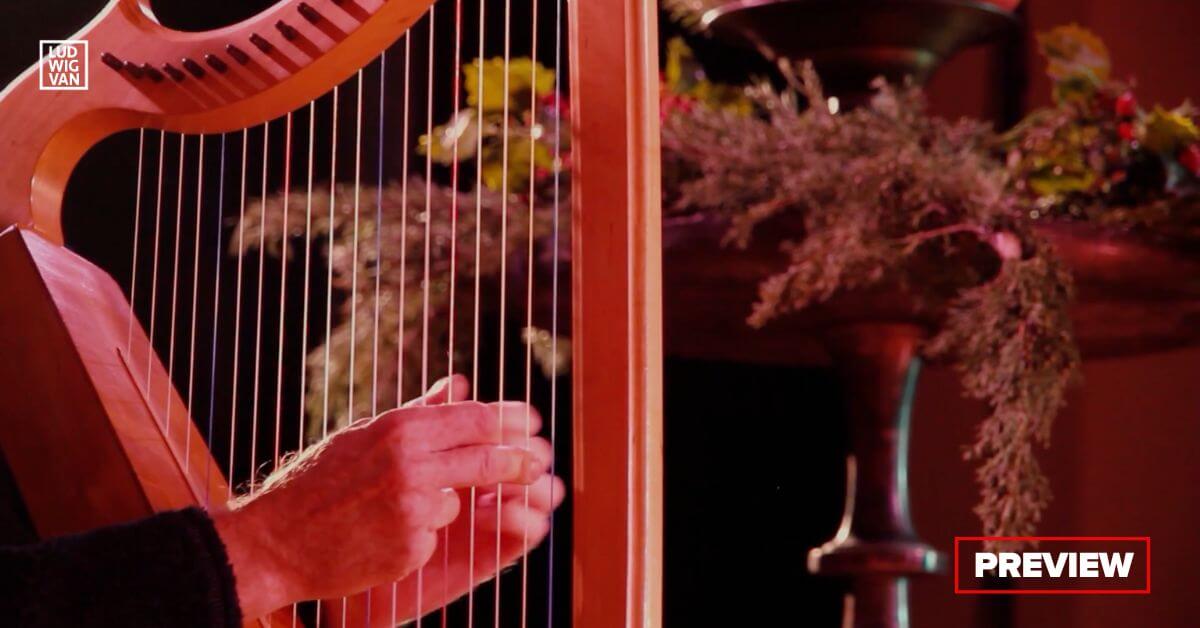
“It would be really great to get everyone unplugged,” says Addie Smith, Senior Director (Engagement and Education) of The Toronto Consort. He’s talking about the experience offered by Medieval Christmas, a concert that will fill Jeanne Lamon Hall in Trinity-St. Paul’s Centre with candlelight and music on December 8 and 9.
The music of the Middle Ages speaks to an era that moved at a different pace, with different values; its beauty, however, is universal. The concert, which includes projections that add to the atmosphere along with flickering candles, was first developed in 2016.
“It’s a really fantastic show,” Smith adds.
The music of the Middle Ages
The Medieval era in Western music laid the foundations for the Renaissance and Baroque periods that would follow. Distinctions were made between sacred and secular music, and many of the compositions were written for voice.
Musical notation systems were being created and developed during this period, enabling the music to spread from one area to another. Polyphony (the combination of multiple notes and/or melodies) was also being developed during the Middle Ages.
There’s a taste of the music and performance made available via Toronto Consort’s Early Music TV free of charge [HERE]. They’re performing Laude novella sia cantata – Cortona, c. 1280.
The Laude novella sïa cantata comes from the Laudario di Cortana, discovered about 140 years ago in Tuscany. The 13th century manuscript contains is essentially a collection of laude, a type of sacred song sung in the vernacular language.
It’s an example of a lyric song performed in the vernacular language, as opposed to Latin, a trend that had begun in the 12th century. Laude would become popular for centuries. The poetry is subjective and personal, unlike many other song forms of the era, and often very emotional. Both composers and singers came from all levels of medieval society.
It’s become strongly associated with Christmas, and is represented in many languages, including Italian, French, and English.
The Concert
The concert features vocalists and instrumentalists, including:
- Alison Melville (flutes and recorders)
- Paul Jenkins (tenor, harp)
- Esteban La Rotta (plucked strings)
- Ben Grossman (percussion)
- Laura Pudwell (mezzo-soprano)
- Michele DeBoer (soprano)
- Cory Knight (tenor)
- Olivier Laquerre (bass)
Pre-show Lecture
A video lecture before the concert will add to your ,understanding of the era’s music. Western University’s Kate Helsen, Assistant Professor, Don Wright Faculty of Music, is an expert in the field.
Prior to taking up the position at Western, Kate Helsen held a two-year post-doctoral fellowship from the Social Sciences and Humanities Research Council of Canada at the University of Toronto. There, she researched the transition between neumes and square notation in the 12th and 13th centuries. She completed her doctoral degree at the University of Regensburg in Germany, and she has published widely in a number of academic journals devoted to early music.
Kate was a team member of the Musical Exchanges 1100 – 1650 project at the Centro de Estudos de Sociologia e Estética Musical (CESEM) University of Lisbon from 2009 to 2013. Her current research explores the use of digital technology, including document analysis software, in the field of early music.
She is also a professional singer, currently with the Tafelmusik Chamber Choir.
- More information about the performances on December 8 and 9, and tickets available [HERE].
Are you looking to promote an event? Have a news tip? Need to know the best events happening this weekend? Send us a note.
#LUDWIGVAN
Get the daily arts news straight to your inbox.
Sign up for the Ludwig Van Toronto e-Blast! — local classical music and opera news straight to your inbox HERE.
- PREVIEW | SUMMER OPERA LYRIC THEATRE Presents Handel’s Xerxes, Mozart’s Idomeneo & Puccini’a La Boheme July 26 To August 4 - July 26, 2024
- PREVIEW | YENSA Festival V.2 Offers Black Flames Performances & Other Ways To Celebrate Black Women In Dance - July 25, 2024
- PREVIEW | Canadian Talent Conspicuous In The Met: Live In HD 2024-25 Season - July 25, 2024



